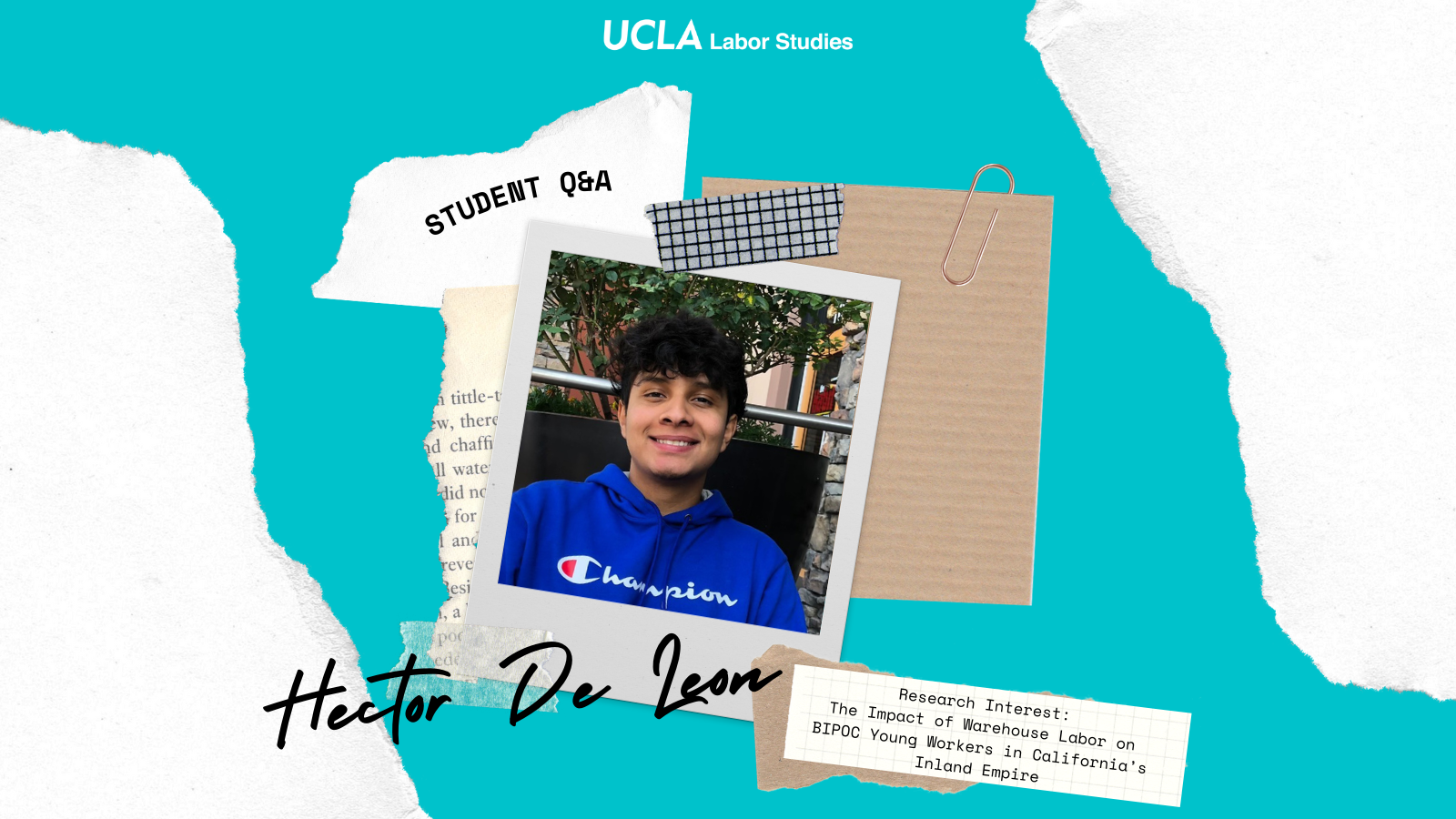Student Researcher Q&A: Hector De Leon on The Impact of Warehouse Labor on BIPOC Young Workers in California’s Inland Empire
Hector will be presenting the research project Vacuum of Social Mobility: The Impact of Warehouse Labor on Predominantly BIPOC Young Workers (18-22) in California’s Inland Empire at the Undergraduate Research & Creativity Showcase on May 25, as part of UCLA Undergraduate Research Week (May 24-28).
Can you tell us a little bit about yourself and your research interests?
Hello! I am Hector De Leon (he/him/his) a current sophomore studying Labor Studies and Public Affairs! I am the proud son of loving parents from Jalisco, Mexico. Born and raised in the Inland Empire, my upbringing and surrounding environment shaped my research interests. I hold a deep passion for social justice through the lenses of policy, the environment, education, and worker’s rights. Over 1,000 schools and daycares throughout the Inland Empire live within half a mile from a warehouse. This includes my home and all of the schools I attended until now. Specifically, I am interested in illuminating how warehouses and other developments, shaped by policy, impact BIPOC, low-income, and immigrant communities.
What is your research project topic?
My research project investigates how the racialization of neoliberalism has resulted in disproportionate placement and development of warehouses in BIPOC, low-income, and immigrant communities in the Inland Empire. In particular, I conducted interviews with young warehouses workers aged 18-22 to show how warehouses impact people and youth in these communities.
What is one notable finding from your research?
The most salient finding from this project is the impact their job at a warehouse affected several other aspects of their life. Many partner-participants shared the stress and heavy hours from work limiting their ability to balance their personal life, relationships, and schooling. One notable example is how one person recalls them and their coworkers being forced to work for 21 days straight or risk losing their job.
How was your experience conducting research remotely?
My experience conducting research remotely was honestly pretty great! I conducted a handful of interviews, and due to the flexibility of zoom meetings, I was able to meet with multiple people throughout the day and record the meetings- making the transcription process significantly easier! The partner-participants I interviewed all work (or worked) at warehouses and have busy schedules, so the virtual setting was convenient for everyone involved! I definitely recommend virtual interviews if it fits the requirements!
What advice would you give others who are considering pursuing their own research project?
For others pursuing a research project, I recommend 3 things:
1) Asking lots of people lots of questions. Learn from how others have conducted their projects and try to absorb their research methodologies to apply different techniques to your own!
2) Learn about and search up all types of faculty throughout campus, don’t limit yourself to just the research interests of your potential faculty mentor because what I think is even more important is their experience with the types of research and methodologies you want to pursue. Find someone who is kind and experienced with conducting research projects. I want to shoutout the amazing Saba Waheed for being the best Faculty Mentor ever!
3) Trial and error! Do some practice runs on interviews and presentations with people you trust. Good feedback can come from anywhere! 🙂
What skills have you learned from research experience?
I want to give a tremendous thank you to Saba Waheed, the Research Director at UCLA’s Labor Center for her incredible guidance. Through her mentorship, I grew immensely as a researcher and expanded my skills. In particular, I learned how to apply the heavy content in my interviews into a codebook and different software because of Saba Waheed’s guidance!
What’s the most fulfilling part of working on your project?
Without a doubt, being able to amplify and share the stories of people I grew up with (including some of my own family members) is something I value immensely. I’ve seen how the experience of working at a warehouse is for those I know personally. More of the conversation around this issue of warehousing/logistics needs to be centered on the people and the youth from this area who are entering the workforce and need diverse opportunities.


